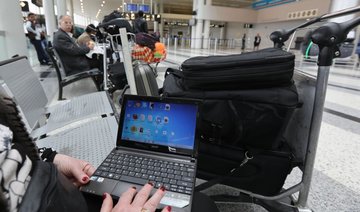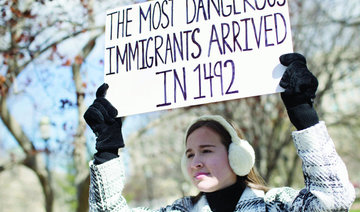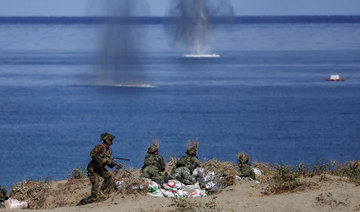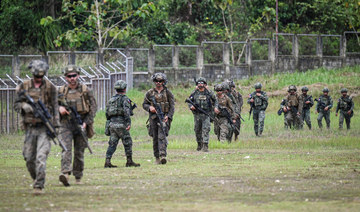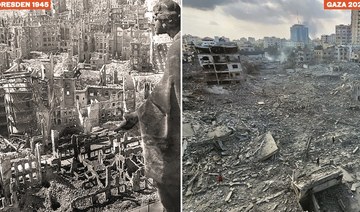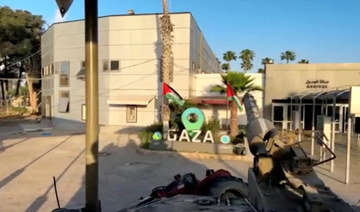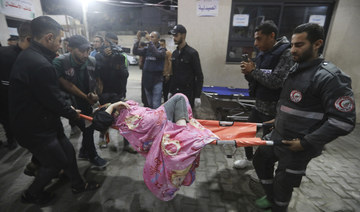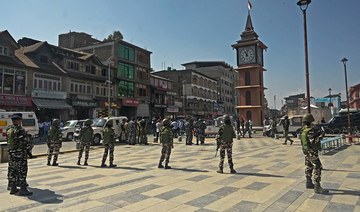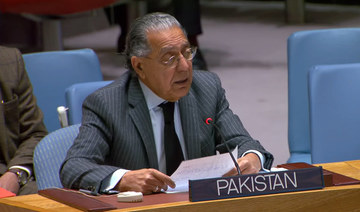BRUSSELS: The European Union has demanded urgent talks with the United States over a possible extension to some European countries of a US ban on airline passengers taking laptops into cabins, saying any security threats faced are common.
The Trump administration is likely to extend the ban already applicable to flights originating from 10 specific airports in the Middle East, north Africa and Turkey because of fears that a concealed bomb could be installed in electronic devices taken onto an aircraft, officials said.
In a letter to John Kelly, Secretary of Homeland Security, and Elaine Chao, US Secretary of Transportation, and seen by Reuters, the EU executive said it was important that information concerning possible threats involving EU airports be shared.
“We therefore reiterate our willingness to pursue constructive dialogue and we propose that meetings are held as a matter of urgency, both at political and technical level, to jointly assess the risk and review possible common measures,” wrote Violeta Bulc, EU Transport Commissioner, and Dimitris Avramopoulos, Commissioner for Migration, Home Affairs and Citizenship.
While no decision has yet been taken, any restrictions could hit major European airlines such as Lufthansa, British Airways, Air France-KLM and industry sources have said airlines and airports have already been working on possible contingency measures.
Olivier Jankovec, director-general of airport trade association ACI Europe, said it was worrying that there appeared to be little coordination between the EU and the United States.
“We know that in the current geopolitical context, with the kind of terrorist threat we face, an efficient response is really predicated on international cooperation — around the threat assessment and the sharing of intelligence. This is not taking place,” Jankovec said at a CAPA Center for Aviation industry conference near Dublin.
The United States imposed the ban in March and was quickly followed by Britain which imposed restrictions on a slightly different set of routes.
European aviation security experts are meeting in Brussels on Thursday to consider possible responses to any extension of the ban. Two EU officials said the discussions had so far concentrated on maintaining a common front.
The EU Ambassador to the United States will meet with Kelly in the coming days to discuss the issue, one of the officials said.
“It is in our common interest that we work closely together to address developing threats in aviation, in advance of any potential applications of new security measures to air carriers operating from the EU to the US,” the Commissioners wrote.
Malaysia Airlines CEO Peter Bellew told Reuters on the sidelines of the CAPA conference that an extension of the laptop ban would be a “pity” and make it more difficult for people to travel.
“I do think it is going to have a fundamental impact on travel to north America and I don’t think that is going to go away quickly,” Bellew said.
European regulators have warned placing what could be potentially hundreds of devices in the hold on long-haul flights could compromise safety by increasing the risk of fire from poorly deactivated lithium-ion batteries.
“What is very important for us is also that any security challenge would not be mitigated by creating a safety challenge,” said Henrik Hololei, director-general of the European Commission’s transport department, at the same Dublin conference
Hololei declined to comment on the prospect of reciprocal action being taken by Europe should the laptop ban be extended.
“I don’t want to speculate at this stage about next steps since nothing has been yet issued. It is slightly premature but it is clear that we have also looked into all the possible options,” Hololei said.
EU demands urgent talks with Washington over airline laptop ban
EU demands urgent talks with Washington over airline laptop ban

Russian court says US soldier charged with theft causing ‘significant’ damage

- Detention of Gordon Black presents yet another diplomatic headache for the US
- The US soldier was detained in early May in Vladivostok, in Russia’s Far East
The detention of Black, who the Pentagon said traveled to Russia without authorization, presents yet another diplomatic headache for the United States, which has warned US citizens against all travel to Russia.
He was detained in early May in Vladivostok, in Russia’s Far East.
The Pervomaisky District Court of Vladivostok said in a statement that it had decided on the preventive measure to detain Black until July 2 for “secretly stealing the property of citizen T., causing the latter significant damage.”
“When choosing the preventive measure in the form of detention, the court came to the conclusion that US citizen B. (Black) — under the weight of the charges — could hide from the preliminary investigation authorities and the court to avoid responsibility,” the court said in the statement.
Earlier, the court’s press service identified the soldier as Gordon Black.
The Russian interior ministry in Vladivostok said on Tuesday that a 32-year-old woman had filed a complaint against the 34-year-old suspect.
The two had met in South Korea. The American had come to Vladivostok to visit her, the two had an argument, and she later filed a police report accusing him of stealing money, it said. He was arrested in a local hotel, having bought a plane ticket to return home.
The Pentagon said on Tuesday that before his arrest in Russia, Black not only broke Army rules by traveling to the Russian city of Vladivostok without authorization, but he did so after passing through China.
US, Philippine and Australian forces sink a ship during war drills in the disputed South China Sea
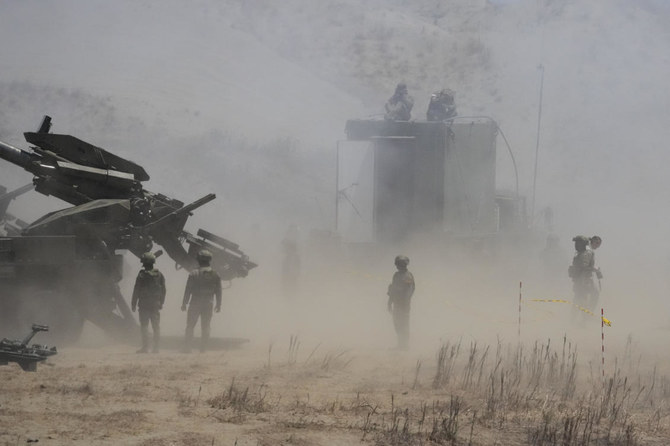
- Philippine President Ferdinand Marcos Jr.has ordered his military to shift its focus to external defense from decades-long domestic anti-insurgency operations
LAOAG, Philippines: Military force from the United States, Australian and the Philippines launched a barrage of high-precision rockets, artillery fire and airstrikes to sink a ship Wednesday as part of largescale war drills in waters facing the disputed South China Sea that have antagonized Beijing.
Military officials and diplomats from several countries, along with journalists, watched the display of firepower from a hilltop along a sandy coast in Laoag City on Wednesday in Ilocos Norte, Philippine President Ferdinand Marcos Jr.’s northern home province.
More than 16,000 military personnel from the United States and the Philippines, backed by a few hundred Australian troops and military observers from 14 countries were participating in annual combat-readiness drills called Balikatan, Tagalog for shoulder-to-shoulder, which started on April 22 and will end on Friday.
It’s the latest indication of how the United States and the Philippines have bolstered a defense treaty alliance that started in the 1950s.
Marcos has ordered his military to shift its focus to external defense from decades-long domestic anti-insurgency operations as China’s increasingly aggressive actions in the South China Sea become a top concern. That strategic shift dovetails with the efforts of President Joe Biden and his administration to reinforce an arc of alliances in the Indo-Pacific region to counter China.
China has angered the Philippines by repeatedly harassing its navy and coast guard ships with the use of powerful water cannons, a military-grade laser, blocking movements and other dangerous maneuvers in the high seas near two disputed South China Sea shoals that have led to minor collisions. Those have caused several injuries to Filipino navy personnel and damaged supply boats.
“We’re under the gun,” Philippine ambassador to Washington Jose Romualdez told The Associated Press in a telephone interview.
“We don’t have the wherewithal to be able to fight all of this bullying coming from China so where else will we go?” Romualdez asked. “We went to the right party which is the United States and those that believe in what the US is doing.”
China has accused the Philippines of setting off the hostilities in the disputed waters by encroaching into what it says are its offshore territories, demarcated by 10 dashes on a map. This has often prompted the Chinese coast guard and navy to take steps to expel Philippine coast guard and other vessels from that area. The Philippines, backed by the US and its allies and security partners, has repeatedly cited a 2016 international arbitration ruling based on the United Nations Convention of the Law of the Sea that invalidated China’s claim over virtually the entire South China Sea on historical grounds.
China did not participate in the arbitration complaint filed by the Philippines in 2013, rejected the ruling, and continues to defy it.
After an hour of the combat-readiness drills, black smoke started to billow from the stern of the mock enemy ship that was struck by missile fire and it started to sink ,as shown on a monitor watched by foreign military guests and journalists. US and Philippine warplanes later dropped bombs on the BRP Lake Caliraya, the target ship, which was made in China but decommissioned by the Philippine navy in 2020 due to mechanical and electrical issues, according to Philippine military officials.
Philippine military officials said the maneuvers would bolster the country’s coastal defense and disaster-response capabilities and claimed they were not aimed at any country. China has opposed military drills involving US forces in the region as well as increasing US military deployments, which it warned would ratchet up tensions and hamper regional stability and peace.
Washington and Beijing have been on a collision course over China’s increasingly assertive actions to defend its vast territorial claims in the South China Sea, and Beijing’s stated goal of annexing Taiwan, by force if necessary.
In February last year, Marcos approved a wider US military presence in the Philippines by allowing rotating groups of American military forces to stay in four more Philippine military camps. That was a sharp turnaround from his predecessor Rodrigo Duterte, who feared that a larger American military footprint could antagonize Beijing.
China strongly opposed the move, which would allow US forces to establish staging grounds and surveillance posts in the northern Philippines across the sea from Taiwan, and in western Philippine provinces facing the South China Sea.
China has warned that a deepening security alliance between Washington and Manila and their ongoing military drills should not harm its security and territorial interests or interfere in the territorial disputes. The Philippines countered that it has the right to defend its sovereignty and territorial interests.
“An alliance is very important to show China that you may have all the ships that you have, but we have a lot of firepower to sink all of them,” Romualdez said.
US paused bomb shipment to Israel to signal concerns over Rafah invasion, official says
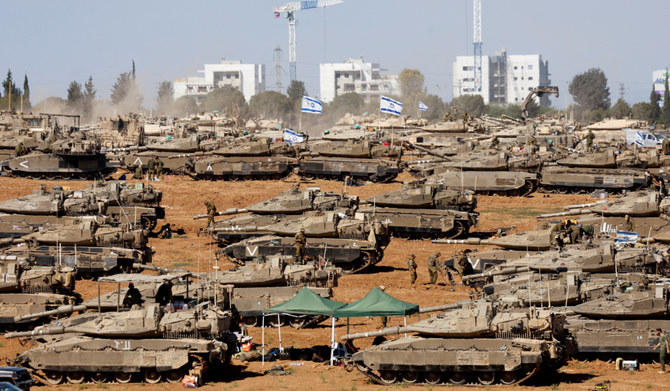
- Israel has killed more than 34,700 Palestinians in Gaza, mostly women and children, according to the health ministry in the Hamas-run territory
- The State Department is separately considering whether to approve the continued transfer of Joint Direct Attack Munition kits, which place precision guidance systems onto bombs, to Israel, but the review didn’t pertain to imminent shipments
WASHINGTON: The US paused a shipment of bombs to Israel last week over concerns that Israel was approaching a decision on launching a full-scale assault on the southern Gaza city of Rafah against the wishes of the US, a senior administration official said Tuesday.
The shipment was supposed to consist of 1,800 2,000-pound bombs and 1,700 500-pound bombs, according to the official, who spoke on the condition of anonymity to discuss the sensitive matter, with the focus of US concern being the larger explosives and how they could be used in a dense urban setting. More than 1 million civilians are sheltering in Rafah after evacuating other parts of Gaza amid Israel’s war on Hamas, which came after the militant group’s deadly attack on Israel on Oct. 7.
President Joe Biden’s administration in April began reviewing future transfers of military assistance to Israel as Prime Minister Benjamin Netanyahu’s government appeared to move closer toward an invasion of Rafah, despite months of opposition from the White House. The official said the decision to pause the shipment was made last week and no final decision had been made yet on whether to proceed with the shipment at a later date.
The State Department is separately considering whether to approve the continued transfer of Joint Direct Attack Munition kits, which place precision guidance systems onto bombs, to Israel, but the review didn’t pertain to imminent shipments.
Some colleges that had been permissive of pro-Palestinian protests begin taking a tougher stance
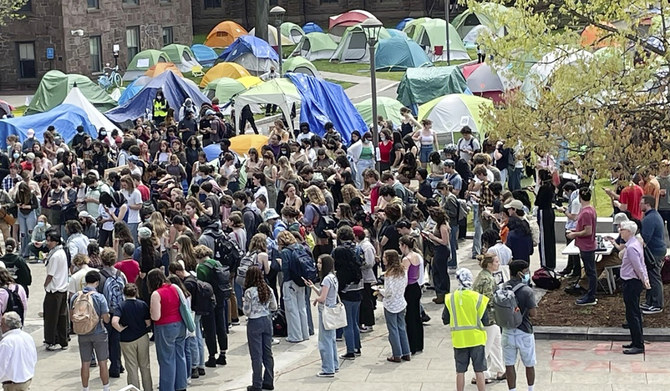
- Tensions have continued to ratchet up in standoffs with protesters on campuses across the US — and increasingly, in Europe — nearly three weeks into a movement launched by a protest at Columbia University
- Israel has killed more than 34,700 Palestinians in Gaza, mostly women and children, according to the health ministry in the Hamas-run territory
CHICAGO: Police cleared a pro-Palestinian tent encampment at the University of Chicago on Tuesday after administrators who had initially adopted a permissive approach said the protest had crossed a line and caused growing concerns about safety.
University President Paul Alivizatos acknowledged the school’s role as a protector of freedom of speech after officers in riot gear blocked access to the school’s Quad but also took an enough-is-enough stance.
“The university remains a place where dissenting voices have many avenues to express themselves, but we cannot enable an environment where the expression of some dominates and disrupts the healthy functioning of the community for the rest,” Alivizatos wrote in a message to the university community.
Tensions have continued to ratchet up in standoffs with protesters on campuses across the US — and increasingly, in Europe — nearly three weeks into a movement launched by a protest at Columbia University. Some colleges cracked down immediately on protests against the Israel-Hamas war. Among those that have tolerated the tent encampments, some have begun to lose patience and call in police over concerns about disruptions to campus life, safety and the involvement of nonstudents.
Since April 18, just over 2,600 people have been arrested on 50 campuses, figures based on AP reporting and statements from universities and law enforcement agencies.
But not all schools are taking that approach, with some letting protesters hold rallies and organize their encampments as they see fit.
The president of Wesleyan University, a liberal arts school in Connecticut, has commended the on-campus demonstration — which includes a pro-Palestinian tent encampment — as an act of political expression. The camp there has grown from about 20 tents a week ago to more than 100.
“The protesters’ cause is important — bringing attention to the killing of innocent people,” university President Michael Roth wrote to the campus community Thursday. “And we continue to make space for them to do so, as long as that space is not disruptive to campus operations.”
The Rhode Island School of Design, where students started occupying a building Monday, affirms students’ rights to freedom of speech and peaceful assembly and supports all members of the community, a spokesperson said. The school said President Crystal Williams spent more than five hours with the protesters that evening discussing their demands.
On Tuesday the school announced it was relocating classes that were scheduled to take place in the building. It was covered with posters reading “Free Palestine” and “Let Gaza Live,” and dove was drawn in colored chalk on the sidewalk.
Campuses have tried tactics from appeasement to threats of disciplinary action to resolve the protests and clear the way for commencements.
At the University of Chicago, hundreds of protesters gathered for at least eight days until administrators warned them Friday to leave or face removal. On Tuesday, law enforcement dismantled the encampment.
Officers later picked up a barricade erected to keep protesters out of the Quad and moved it toward the demonstrators, some of whom chanted, “Up, up with liberation. Down, down with occupation!” Police and protesters pushed back and forth along the barricade as the officers moved to reestablish control.
Officials at the University of North Carolina, Chapel Hill, told deans and department chairs Monday that some students have been informed by instructors opposing the suspension of student protesters that they will withhold grades.
The school provost’s office said it will support “sanctions for any instructor who is found to have improperly withheld grades.”
At the Massachusetts Institute of Technology, protesters were given a deadline to voluntarily leave or face suspension. Many left, according to an MIT spokesperson, who said protesters breached fencing after the arrival of demonstrators from outside the university. On Monday night, dozens remained at the encampment in a calmer atmosphere.
MIT officials said the following day that dozens of interim suspensions and discipline committee referrals were in process, actions taken to ensure the “safety of our community.”
Sam Ihns, a graduate student studying mechanical engineering and a member of MIT Jews for a Ceasefire, said the group has been there for two weeks and is calling for an end to the killing in Gaza.
“Specifically, our encampment is protesting MIT’s direct research ties to the Israeli Ministry of Defense,” he said.
Many protesters want schools to divest from companies that do business with Israel or otherwise contribute to the war effort. Others simply want to call attention to the deaths in Gaza and for the war to end.
Wesleyan senior Uday Narayanan said students there are prepared to protest through the summer if that’s what it takes for their demands to be met.
“Our tuition dollars are still going toward the brutalization of Palestinians,” the 21-year-old physics major said. “So, ultimately, even though our president has said, ‘Oh, I’m not going to call the cops. Oh, I’m not going to beat up students,’ that’s still not enough, and that’s not the bare minimum for us.”
And as Wesleyan’s May 26 commencement approaches, some protesters fear they will be forcibly removed from the center of campus, adjacent to the field where the ceremony is to take place.
“The longer we are here, the more that their facade of laid back, hands off is falling away,” said Batya Kline, a 22-year-old graduate student. “We know that the university does not want us here, and we know that they can change their pace at the drop of a hat without letting us know.”
Frank Straub, senior director of violence prevention at nonprofit advocacy organization Safe and Sound Schools, said these and past protests have shown the need for early dialogue among the university, police and protesters to establish ground rules.
Straub said Wesleyan, for example, needs to have conversations about commencement and where protesters can be, and should make sure a plan is in place to respond, should protesters want to get arrested, so that can be done without violence.
“By their nature, protests are adversarial, but I think we can have controlled adversity,” he added. “And I think the more campus officials are engaged with the protesters and the more police are included in those conversations, that’s critically important.”
The protests stem from the conflict that started Oct. 7 when Hamas militants attacked southern Israel, killing about 1,200 people, mostly civilians, and taking roughly 250 hostages.
Vowing to destroy Hamas, Israel launched an offensive in Gaza that has killed more than 34,500 Palestinians, about two-thirds of them women and children, according to the Health Ministry in the Hamas-ruled territory. Israeli strikes have devastated the enclave and displaced most of its inhabitants.
Two suspected Kashmir rebels killed in clash with Indian forces
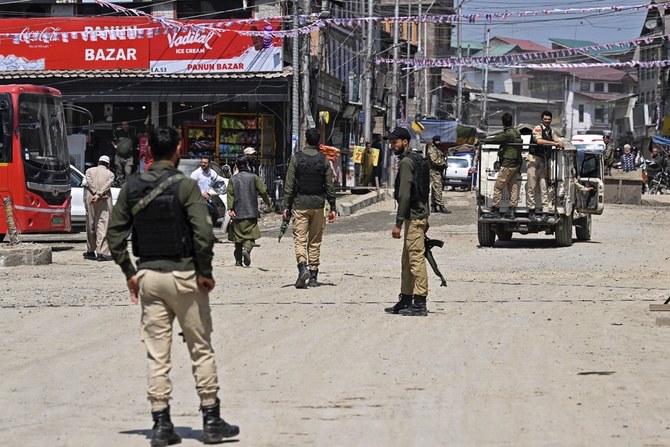
SRINAGAR, India: Two suspected rebels were killed in Indian-administered Kashmir during a firefight with soldiers, police said Tuesday, at a time when campaigning for national elections is underway in the disputed territory.
Scores of soldiers besieged a residential area in southern Kulgam district, some 70 kilometers (43 miles) from Kashmir’s biggest city Srinagar, on Monday after armed militants were suspected to be present inside a house.
Two bodies of the suspected rebels “were recovered so far” from the site, police said in a statement posted Tuesday on social media platform X.
Images from the area showed smoke billowing from a house after it caught fire during the skirmish.
Kashmir has been divided between India and Pakistan since their independence in 1947, with both claiming the Himalayan territory in full.
Rebel groups opposed to Indian rule have for decades waged an insurgency in Indian-controlled Kashmir, demanding either independence or a merger with Pakistan.
The conflict has left tens of thousands of civilians, soldiers and militants dead.
Violence and anti-India protests have drastically reduced since 2019, when Prime Minister Narendra Modi’s government canceled the Muslim majority region’s limited autonomy.
But clashes between security forces and rebel groups have increased since voting began last month in India’s six-week election.
Three suspected rebels were killed and a police officer and three soldiers wounded in three separate clashes across the territory in April.
Militants ambushed a military convoy in Kashmir’s south on Sunday, killing one Indian air force corporal and wounding four other troops.


